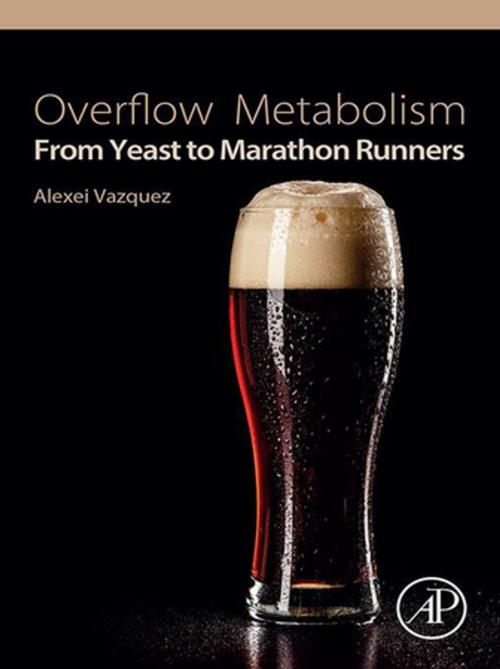Overflow Metabolism
From Yeast to Marathon Runners
Nonfiction, Health & Well Being, Medical, Medical Science, Biochemistry, Science & Nature, Science, Biological Sciences| Author: | Alexei Vazquez | ISBN: | 9780128123355 |
| Publisher: | Elsevier Science | Publication: | October 16, 2017 |
| Imprint: | Academic Press | Language: | English |
| Author: | Alexei Vazquez |
| ISBN: | 9780128123355 |
| Publisher: | Elsevier Science |
| Publication: | October 16, 2017 |
| Imprint: | Academic Press |
| Language: | English |
Overflow Metabolism: From Yeast to Marathon Runners provides an overview of overflow metabolism, reviewing the major phenomenological aspects as observed in different organisms, followed by a critical analysis of proposed theories to explain overflow metabolism. In our ideal view of metabolism, we think of catabolism and anabolism. In catabolism nutrients break down to carbon dioxide and water to generate biochemical energy. In anabolism nutrients break down to generate building blocks for cell biosynthesis. Yet, when cells are pushed to high metabolic rates they exhibit incomplete catabolism of nutrients, with a lower energy yield and excretion of metabolic byproducts.
This phenomenon, characterized by the excretion of metabolic byproducts that could otherwise be used for catabolism or anabolism, is generally known as overflow metabolism. Overflow metabolism is a ubiquitous phenotype that has been conserved during evolution. Examples are the acetate switch in the bacterium E. coli, Crabtree effect in unicellular eukaryote yeasts, the lactate switch in sports medicine, and the Warburg effect in cancer. Several theories have been proposed to explain this seemingly wasteful phenotype. Yet, there is no consensus about what determines overflow metabolism and whether it offers any selective advantage.
- Includes examples of overflow metabolism and major phenomenological features
- Features a critical view of proposed theories to explain overflow metabolism
- Provides a summary of our preview work, proposing molecular crowding as the cause of overflow metabolism, together with new unpublished results
Overflow Metabolism: From Yeast to Marathon Runners provides an overview of overflow metabolism, reviewing the major phenomenological aspects as observed in different organisms, followed by a critical analysis of proposed theories to explain overflow metabolism. In our ideal view of metabolism, we think of catabolism and anabolism. In catabolism nutrients break down to carbon dioxide and water to generate biochemical energy. In anabolism nutrients break down to generate building blocks for cell biosynthesis. Yet, when cells are pushed to high metabolic rates they exhibit incomplete catabolism of nutrients, with a lower energy yield and excretion of metabolic byproducts.
This phenomenon, characterized by the excretion of metabolic byproducts that could otherwise be used for catabolism or anabolism, is generally known as overflow metabolism. Overflow metabolism is a ubiquitous phenotype that has been conserved during evolution. Examples are the acetate switch in the bacterium E. coli, Crabtree effect in unicellular eukaryote yeasts, the lactate switch in sports medicine, and the Warburg effect in cancer. Several theories have been proposed to explain this seemingly wasteful phenotype. Yet, there is no consensus about what determines overflow metabolism and whether it offers any selective advantage.
- Includes examples of overflow metabolism and major phenomenological features
- Features a critical view of proposed theories to explain overflow metabolism
- Provides a summary of our preview work, proposing molecular crowding as the cause of overflow metabolism, together with new unpublished results















